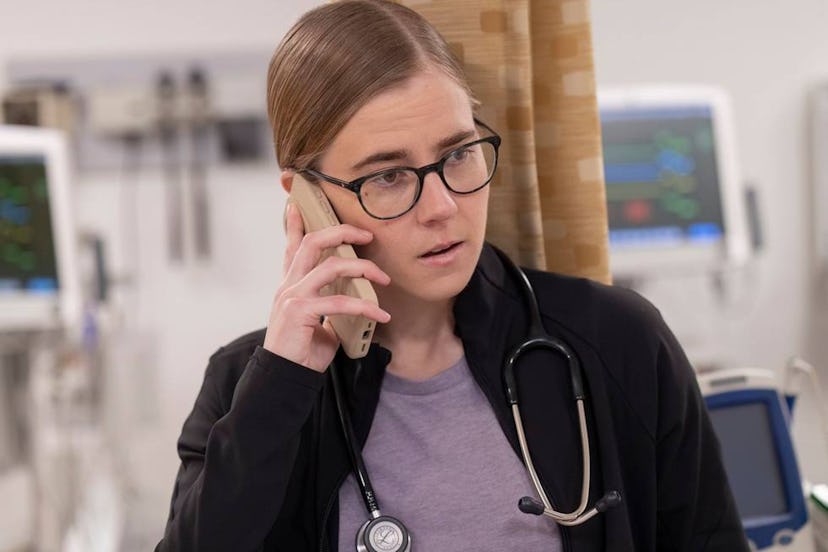Bustle Exclusive
On The Pitt, Taylor Dearden’s Dr. Mel King Is The Heart Of The ER
With Season 1 in the rearview, the actor breaks down her fan-favorite character.

In the April 10 finale of The Pitt, second-year resident Dr. Mel King (Taylor Dearden) finally gets off her grueling 15-hour shift in the emergency room. Even though she could absolutely use an early night, she’s not going home, but to a local care facility to pick up her sister, Becca, who’s on the autism spectrum. They have standing dinner plans: pizza, spaghetti, and an Elf rewatch.
It’s this kindness that has made Mel so beloved by fans, who praise her earnestness and sensitivity. (After all, Hollywood’s seen enough steely-eyed doctors.) Dearden has been open about using her experience as a person with ADHD to inform Mel, who feels her patients’ highs and lows deeply. In the season’s penultimate episode, after reuniting a mass shooting survivor with her daughter, Mel takes a beat to cry.
“Mel is like, ‘Do I have to change who I am to do this?’” Dearden says of the scene. Her boss, ER chief Dr. “Robby” Robinavitch (Noah Wyle), assures her she doesn’t: It’s good to care.
The sentiment was reassuring to fans, who really care — both about Mel’s soft heart, and the fact that the season’s come to an end. Fortunately, though, more is on the way.
Season 2’s medical “boot camp” — a two-week crash course in medicine, taught by real medical professionals — begins in June, Dearden says. In the meantime, she breaks down deleted scenes, Mel and Langdon’s relationship, and a key detail viewers might have overlooked.
Were there any scenes you filmed that didn’t make the final cut?
Oh, of course. Our scripts are like 80 pages, and they cut them down to 45 minutes. There was one funny thing recently that was cut, but it made sense for the flow of the show because it slowed it down too much. It was when we’re in the group huddle, talking about how Whitaker used an IO [intraosseous infusion] on a fully awake patient. At the end, I start trying to make a speech to encourage everyone. And it just goes really, really poorly.
Watching fans discuss the show online, has anything given you pause? Like, “Guys, you’re getting it wrong.”
There have been a lot of things that audiences have missed. The number of people who still haven’t picked up that Santos was abused as a child is bizarre. It was quite clear to me and everyone else.
Totally. I hope people realize after the finale, “Oh, I may have miscalculated.”
Isa [Briones, who plays Santos] has this amazing ability to deliver a searing line that burns, and then she has this immediate regret in her eyes. They have cut a lot of that out, which is interesting. But all of the little bits about her life are supposed to make you soften. And it was just really interesting that people haven’t picked up on it.
It’s a layered story.
It also goes by so fast. Like, my mom has to watch it twice. Otherwise, she doesn’t get it. I usually benefit from watching twice, too.
This show subverts the trope of the Grey’s Anatomy-esque romance. I appreciate that you’ve said Mel and Langdon have a professional friendship. But do you have a theory as to why people are reading more into their interactions?
There’s a big part of it that’s like, everyone wants to [see] this lonely, odd girl win the hot guy. They don’t go together — so they should. It’s natural to want to connect people, but we’re so used to [the idea] that it has to be romantic.
Also, how do doctors have time to hook up in a closet? My God. There’s so much to do. I’m sure some people take really quick power naps wherever they can.
What patient experience do you think will be most foundational for Mel going forward?
A lot of the things that went “wrong” — I’m doing air quotes because I don’t think they went wrong — have to do with people not understanding her and not caring to try. I put my foot in my mouth constantly. And it’s been so great to have friends who know about me, my neurodivergence, and the things that are hard and the things that are easier for me. I’ll say something that can easily be taken the wrong way, but to have my friends go, “She means this,” has been like, Oh, thank God.
I would love for someone to see that and get it [with Mel]. There have been a lot of times when Mel gets yelled at or chastised, and no one’s trying to get why [she acts as she does]. We need people who slow down and ask questions. Asking questions is everything.
This interview has been edited and condensed for clarity.